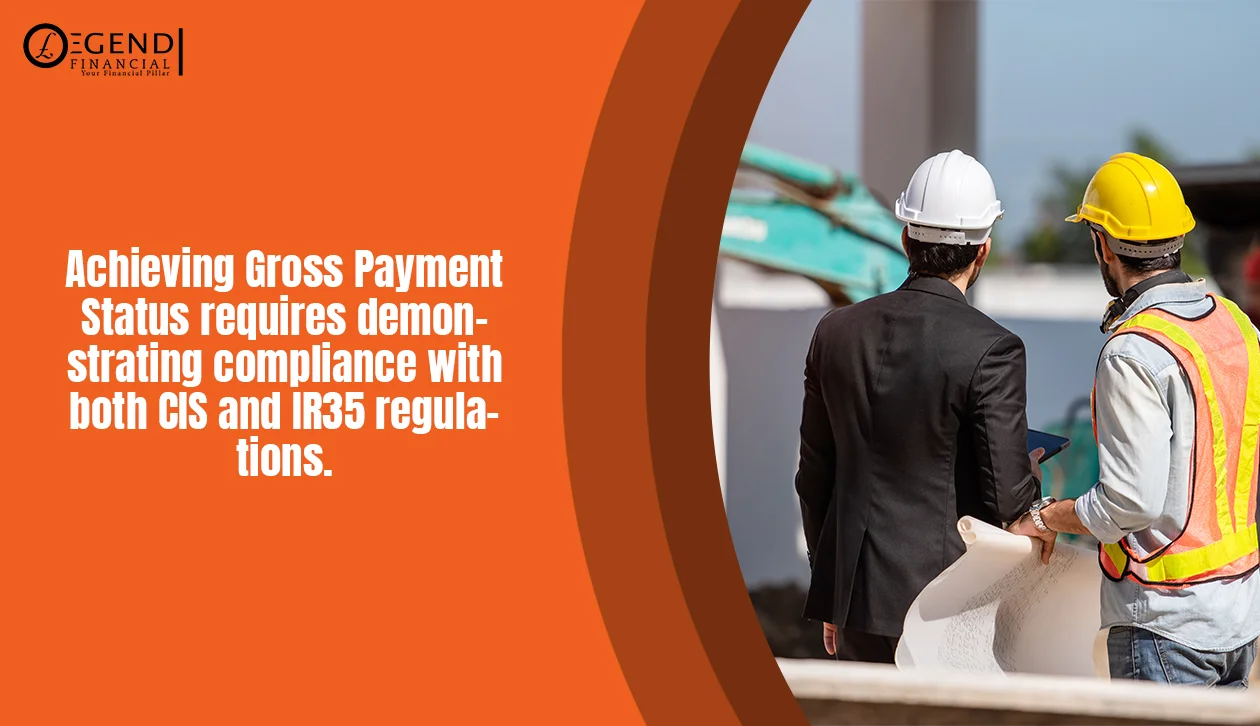Contents
The Construction Industry Scheme (CIS) is a tax deduction system that applies to most construction workers in the UK. Unlike PAYE employees and standard self-employed individuals, CIS-registered contractors and subcontractors face unique tax obligations. This guide covers everything you need to know, from exemptions and gross payment status to key responsibilities under the scheme.
What is the Construction Industry Scheme (CIS)?
CIS is designed by HMRC to regulate how contractors handle payments to subcontractors. Instead of paying subcontractors in full, contractors must deduct a portion of their pay and send it to HMRC as an advance tax payment. These deductions help ensure compliance and prevent tax evasion in the construction sector.
Changes To Construction Industry Scheme
The Construction Industry Scheme (CIS) has undergone several updates in recent years to enhance compliance and streamline tax administration. Keeping up with these changes is important for you as a contractors or a subcontractors to avoid penalties.
Here are some recent and notable updates to CIS:
1. New Compliance Tests for Gross Payment Status
Contractors and subcontractors applying for or maintaining their Gross Payment Status (GPS) must meet stricter compliance requirements. HMRC now assesses businesses more rigorously to ensure they are up to date with tax filings and payments. Any failure to meet these requirements can result in the loss of GPS, leading to deductions from payments at the standard CIS rates.
2. Expanded Scope of CIS Deductions
HMRC has broadened the range of expenses that fall under CIS deductions. This means that certain costs previously considered exempt may now be subject to deduction at source. Contractors must review their payment structures to ensure compliance and avoid unexpected tax liabilities.
3. Strengthened Anti-Fraud Measures
In an effort to combat fraud within the construction sector, HMRC has increased scrutiny on CIS transactions. This includes:
- More frequent audits and compliance checks.
- Additional reporting requirements for contractors dealing with high-value projects.
- Increased penalties for false reporting or non-compliance.
4. New VAT Reverse Charge Implementation
The Domestic Reverse Charge for VAT came into effect, shifting the responsibility of VAT payment from the supplier to the customer in certain construction transactions. This affects CIS-registered businesses, requiring them to adjust their invoicing and payment processes accordingly. Contractors and subcontractors should ensure they understand how this impacts their cash flow and tax obligations.
5. Digital Reporting and Automation
HMRC has been moving towards digital tax reporting, requiring CIS-registered businesses to submit information online more frequently. This shift aims to improve efficiency and reduce errors. Contractors should invest in CIS-compatible accounting software to stay compliant and streamline their tax management.
CIS Tax Deduction
Under CIS, contractors deduct 20% for registered subcontractors and 30% for unregistered ones before making payments. These deductions go toward the subcontractor’s income tax and National Insurance contributions. However, if you hold a Gross Payment Status, you can receive full payments without any deductions, provided you meet HMRC’s compliance benchmarks.
Learn more about CIS payment and deduction statements in this guide.

CIS Scope: Activities That Fall Within the CIS Scheme
The Construction Industry Scheme (CIS) generally covers construction work carried out on permanent or temporary buildings or structures and civil engineering projects. For CIS purposes, the following activities are considered within its scope:
- Demolition and dismantling.
- Alterations, repairs, and decorating.
- Preparing the site, including laying foundations and providing access works.
- Building work.
- Installing systems for heating, lighting, power, water, and ventilation.
- Cleaning the inside of buildings after construction
Construction Industry Scheme Regulations
The Construction Industry Scheme (CIS) is governed by strict regulations set by HMRC that contractors and subcontractors must adhere to. Here are the key CIS regulations:
1. Contractor Obligations
- Verify all subcontractors with HMRC before making payments.
- Deduct the appropriate tax percentage (20% for registered subcontractors, 30% for unregistered ones) and send it to HMRC.
- Submit monthly CIS returns detailing payments and deductions.
- Keep accurate records of all transactions and payments for at least three years.
2. Subcontractor Responsibilities
- Register for CIS to qualify for a reduced tax deduction rate.
- Keep track of all payments received and deductions made.
- Ensure correct information is provided to contractors to avoid excessive deductions.
- Submit a Self-Assessment tax return annually to claim refunds or settle outstanding taxes.
3. Penalties for Non-Compliance
Failure to comply with CIS regulations can lead to significant penalties, including:
- Fines for late or inaccurate CIS returns.
- Interest charges on unpaid deductions.
- Suspension or loss of Gross Payment Status (GPS).
- Legal action for repeated non-compliance.
4. Exemptions and Special Cases
Certain activities and businesses may be exempt from CIS, such as:
- Payments to employees instead of subcontractors.
- Work done for non-construction businesses that does not involve construction operations.
- Some construction-related activities like architecture and surveying.
Read our CIS Registration guide for detailed guidance.
How to Claim Construction Industry Scheme Refund?
If you have had CIS deductions taken from your payments but believe you have overpaid tax, you may be eligible for a CIS refund from HMRC.
Before applying for a refund, check your eligibility. Your CIS deductions should exceed your actual tax liability, you must have accurate records of all CIS deductions and have submitted your Self-Assessment tax return or payroll records (for limited companies).
1. Claiming as a Sole Trader or Partnership
- File your Self-Assessment tax return, including CIS deductions.
- HMRC will calculate whether you are owed a refund.
- Refunds are typically issued as bank transfers, cheque payments, or tax offsets.
2. Claiming as a Limited Company
- If your company operates PAYE, report CIS deductions through Employer Payment Summary (EPS) each month.
- HMRC will offset CIS deductions against PAYE liabilities.
- If you still have excess deductions at the end of the tax year, submit a CIS reclaim request via HMRC.
What is “Exemption” from the CIS Scheme?
Exemption within the Construction Industry Scheme (CIS) does not mean a complete release from all obligations. Rather, it refers to two distinct scenarios:
- Gross Payment Status: This allows subcontractors to receive payments without deductions being made at source.
- Work Outside the Scope of CIS: Certain construction-related activities are simply not covered by the CIS.
Here is a breakdown to clarify these distinctions:
Criteria for Exemption
- Subcontractors with Gross Payment Status: If you meet HMRC’s compliance criteria, you can apply for Gross payment status for the 2024/25 tax year, allowing you to receive full payments without deductions.
- Non-Construction Work: If your services fall outside the scope of CIS, such as architecture, surveying, or material supply without installation, you will not need to register.
- Charities and Non-Profit Organisations: Work done solely for charitable purposes may qualify for CIS exemption. However, compliance with HMRC rules is necessary.
- Private Property Owners: If you are a private homeowner hiring builders for work on your home, CIS will not apply to you.
CIS Exempt Activities
Certain activities within the construction industry do not fall under CIS. Some of the main CIS-exempt activities include:
- Architectural and surveying work
- Scaffolding hire (without labor)
- Delivery of construction materials
- Work on property outside the UK
Even if you believe you qualify for exemption, compliance with HMRC rules implies. Regular audits, tax returns, and adherence to PAYE, VAT, and National Insurance obligations are necessary to avoid penalties.
Achieving Gross Payment Status (no deductions)
Contrary to what many people might think, there is not a literal CIS exemption certificate or a definitive, exhaustive “CIS exemptions list”. However, subcontractors can apply for Gross Payment Status (GPS) to receive payments without tax deductions.
How to Qualify for Gross Payment Status
To achieve Gross Payment Status, you must:
- Demonstrate a clean tax compliance record (timely tax returns and payments).
- Prove financial stability and a minimum annual turnover threshold set by HMRC.
- Be VAT registered (if applicable) and maintain accurate financial records.
- Pass HMRC’s assessment criteria for CIS order compliance.
Eligibility thresholds for annual turnover include:
- £30,000 if you are a sole trader
- £30,000 for each partner in a partnership, or at least £100,000 for the entire partnership
- £30,000 for each director of a company, or at least £100,000 for the whole company
- If your company is controlled by five people or fewer, you must have £30,000 turnover for each controller
Once approved, subcontractors receive full payments with no upfront tax deductions. However, failure to maintain compliance can result in losing GPS privileges.
How to Apply for GPS
Subcontractors can apply for Gross Payment Status through their online business tax account, or by calling the Construction Industry Scheme helpline.
The application process usually takes one to two months, during which the current tax deduction rate (30% for unregistered) continues to apply.
How CIS Exemption Affects Tax Returns and Corporation Tax
Achieving CIS exemption or Gross Payment Status directly impacts how subcontractors handle tax returns and corporation tax. Here’s how:
Tax Returns
Subcontractors with Gross Payment Status must still file annual self-assessment tax returns and report all income. Unlike standard CIS workers, they won’t have deductions at source, meaning they must ensure timely tax payments to avoid penalties.
Corporation Tax
If operating as a limited company, subcontractors must account for income properly in their corporation tax returns. Any failure to declare income accurately may trigger HMRC audits and compliance checks.
PAYE & National Insurance Contributions (NICs)
Exempt businesses must still comply with PAYE regulations if they have employees, if they make correct deductions for NICs and VAT where applicable.
Refund Claims
For those who have had CIS deductions applied before achieving exemption, refunds can be claimed through HMRC’s tax return process. Keeping accurate financial records will streamline this process.
Maintaining compliance with HMRC’s CIS regulations ensures subcontractors and contractors benefit fully from tax exemptions without facing penalties.
How To Accurately Track Expenditure and Income
Accurate financial record-keeping is vital for any business, but it’s especially critical for those operating within the Construction Industry Scheme (CIS). Proper tracking of expenditure and income provides a clear picture of your business’s financial health.
Consider using accounting software like Xero, QuickBooks, or FreeAgent. These tools automate many tasks, such as invoicing, expense tracking, and report generation. They also often integrate with CIS reporting tools.
Keep physical copies of essential documents, such as invoices, receipts, and bank statements, in a secure location. These can serve as backups and may be required for audits.
If you are unsure about any aspect of record-keeping, seek advice from our qualified accountants. They can help you set up a system that meets your specific needs.
Avoiding Non-Compliance and Penalties
HMRC actively monitors contractors and subcontractors to ensure tax obligations are met. Here’s how to stay compliant and avoid penalties:
1. Verify Subcontractor Status
Before making payments, always verify whether your subcontractors are registered under CIS. Incorrect classification can result in higher tax deductions, penalties, and even audits from HMRC.
2. Submit Monthly CIS Returns on Time
Contractors must submit CIS returns by the 19th of each month detailing subcontractor payments and deductions. Late or inaccurate filings can lead to fines ranging from £100 to £3,000, depending on the delay.
3. Keep Accurate Records
Maintain detailed records of payments, tax deductions, and VAT invoices for at least three years. HMRC may request these during compliance checks.
4. Avoid Incorrect Tax Deductions
Deducting too much or too little tax can create refund complications or additional tax liabilities. Use payroll software like Xero to automate calculations and ensure accuracy.
5. Ensure IR35 and PAYE Compliance
If subcontractors are deemed “employees” under IR35 rules (based on factors such as control, substitution, and mutuality of obligation), you must apply PAYE tax and National Insurance deductions. Misclassification can trigger HMRC penalties and additional tax liabilities.
6. Stay Updated on CIS Tax Changes
Tax regulations, including CIS rules and any published CIS orders, change over time. Regularly check for 2024/25 CIS updates to ensure compliance.
FAQs on CIS Exemptions
Whilst a lower turnover does not automatically disqualify you, HMRC considers financial stability, compliance history, and VAT registration when granting exemptions.
If HMRC revokes your Gross Payment Status due to non-compliance, you will revert to standard CIS deductions (20% or 30%). You can reapply after addressing compliance issues.
No, even with CIS exemption or Gross Payment Status, subcontractors must file annual tax returns and pay their due taxes directly to HMRC.
Yes, if they perform construction work in the UK. However, exemptions may apply if the work is carried out entirely outside the UK.
Yes, subcontractors who previously had deductions can claim CIS refund through their tax return, provided they maintain proper financial records.
Get Accurate Deductions and Reporting
Being a part of the Construction Industry Scheme requires careful attention to detail. Accurate deductions and reporting are the cornerstones of successful CIS management. At Legend Financial, we specialise in providing comprehensive CIS tax return services suited to your unique business needs. Our team of experienced financial consultants can guide you through every aspect of the scheme, from initial registration to ongoing compliance.










